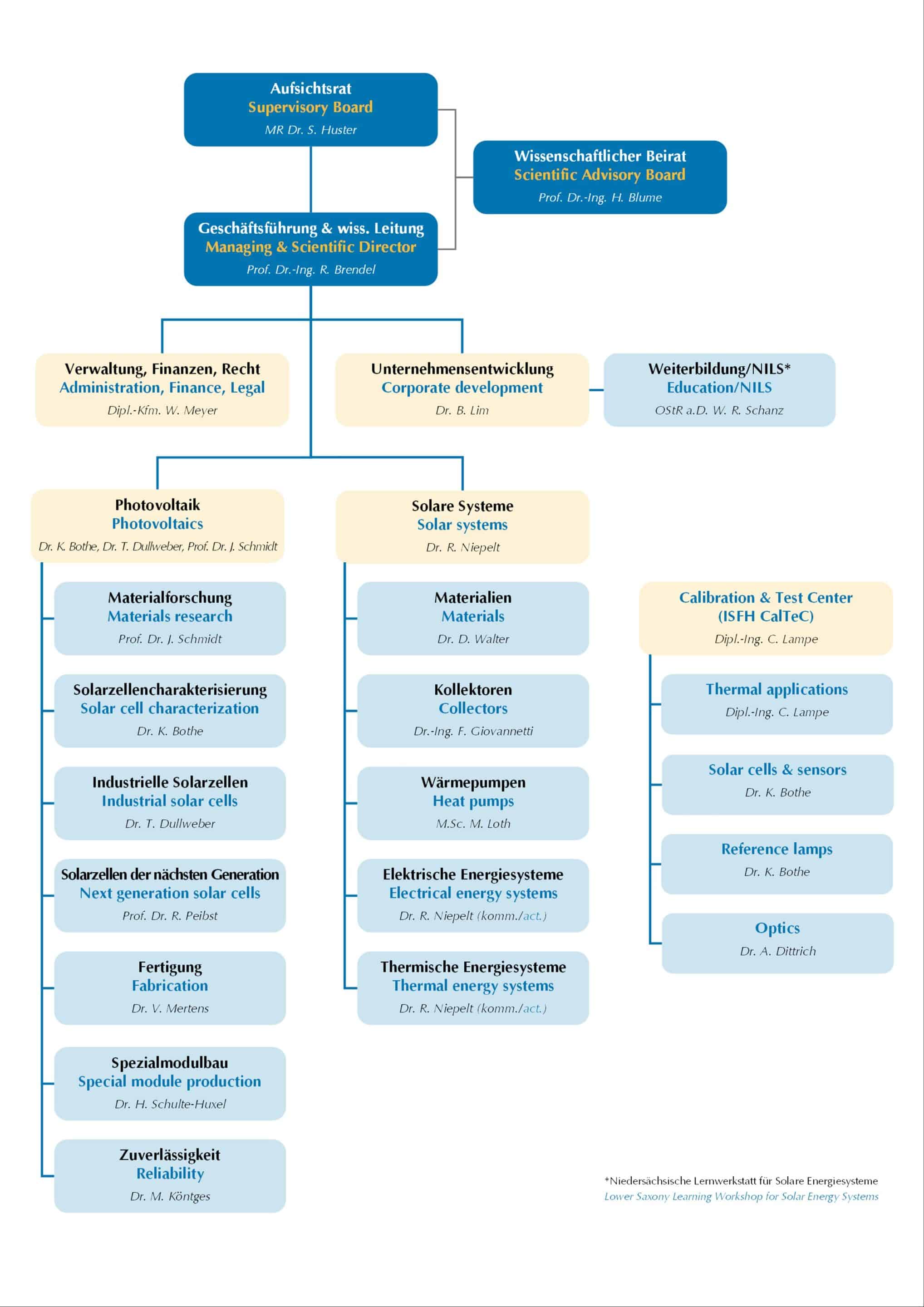About Us
At the Institute for Solar Energy Research in Hamelin (ISFH), we are working on innovative components for the photovoltaic as well as solar thermal utilization of solar energy. The focus is on physical understanding and generalizable technological findings as well as the development of cost-effective processes. The components manufactured at ISFH are tested in energy systems, as only their behavior within a system decides whether a development is successful. The system itself is in this an extremely important part of research work.
We support the utilization of solar energy in collaboration with our partners from industry and our students through research and innovations.
ISFH is a research institute of the state of Lower Saxony and a non-profit limited liability company. We are an associated research institute of the “Gottfried Wilhelm Leibniz Universität Hannover” and also cooperate with other universities and universities of applied sciences in Lower Saxony as well as other federal states. The director of ISFH is Prof. Dr.-Ing. habil. Rolf Brendel, who is also a university professor at the Faculty of Mathematics and Physics of the Leibniz Universität Hannover. Professor Brendel is the head of the department Solar Energy at the Institute of Solid State Physics.
ISFH is made up of the “Photovoltaics” and “Solar systems” departments as well as the independent test center “ISFH CalTeC”.
Photovoltaic research includes the basic study of material properties as well as the development of processes and equipment for manufacturing solar cells. The main interest is the development of new silicon solar cells with efficiencies of more than 24 %, high-efficiency tandem solar cells and the related PV module technology. Above all, the aim is to reduce production costs for solar cells and PV modules.
The main focus of the Solar systems department is the integrated total energy supply with heat and electricity in local units like buildings and urban settlements. The objective is a cost-efficient and CO2-reduced energy supply in high quality systems. For this purpose ISFH develops, evaluates and optimizes amongst others new solar thermal collectors, heat pumps, functional coatings and heat storage concepts as well as new applications and combinations of energy systems.
ISFH CalTeC (Calibration and Test Center) is offering independent and accredited calibration of silicon solar cells as well as assessment of solar absorber coatings, spectroradiometers, and solar thermal systems as well as components.
The central services support the entire infrastructure of the institute. They consist of an administrative department, to which the secretariat, accounting, legal and human resources departments are assigned, and the corporate development department, which comprises the technical areas of facility management, mechanical workshop and IT as well as public relations. The administrative department is headed by Dipl.-Kfm. Wolfgang Meyer, who is an authorized signatory. Dr. Bianca Lim is in charge of corporate development and also an authorized signatory.
The ISFH is a member of the Zuse Association, a technology- and industry-open association of independent industrial research institutions. Furthermore, the Institute is a member of the Renewable Energy Research Association (FVEE), an association of German non-university research institutes coordinating renewable energy research activities at a national level. Moreover the institute is a member of the Laboratory for Nano and Quantum Engineering (LNQE), the Leibniz Research Center Energy 2050 (LiFE 2050) and supports the work of the Energy Research Center of Lower Saxony (efzn).
Supervisory Board
The Supervisory Board appoints, controls and advises the Managing Director. According to the Institute’s statutes it consists of up to nine members. Some of the members are directly appointed by the State of Lower Saxony, the rest being elected by a shareholders’ general meeting. The Supervisory Board also regularly invites guests to its meetings who perform an advisory function.
The members of the Board are
- Dr. Sebastian Huster (Head of the Supervisory Board), Niedersächsisches Ministerium für Wissenschaft und Kultur Hannover
- Jana Miksch (Deputy Head), Niedersächsisches Finanzministerium, Hannover
- Dirk Adomat, Landkreis Hameln-Pyrmont
- Prof. Dr. Rolf Haug, Leibniz Universität Hannover
- Prof. Dr. Bernd Rech, Helmholtz-Zentrum Berlin für Materialien und Energie
- Martin Roßmann, Viessmann Werke GmbH & Co. KG
- Dr. Anke Grieße, Niedersächsisches Ministerium für Umwelt, Energie, Bauen und Klimaschutz, Hannover
Scientific Advisory Board
The Scientific Board advises the Director and the Supervisory Board of the ISFH on all scientific, technical and organizational issues. Board members were nominated by the Lower Saxon Minister for Science and Culture. The Board members are respected scientists from universities and industry as well as other personalities who, through their professionals experience, are familiar with the research topics of the ISFH.
The members of the Scientific Advisory Board are
- Prof. Dr.-Ing. Holger Blume (Head of the Scientific Advisory Board), Leibniz University Hannover – Vice President for Research and Transfer, Hanover
- Dr. Jutta Trube, formerly VDMA (Deputy Head of the Scientific Advisory Board)
- Dr. Gunter Erfurt, formerly Meyer Burger Technology AG
- Prof. Dr.-Ing. Philipp Geyer, Leibniz University Hannover – Sustainable Building Systems, Hanover
- Dr. Michel Haller, SPF Institute for Solar Technology, OST, Eastern Switzerland University of Applied Sciences, Rapperswil, Switzerland
- Dr. Helge Haverkamp, centrotherm international AG, Blaubeuren
- Dr. Winfried Hoffmann, ASE, Hanau
- Prof. Dr.-Ing. Katharina Klemt-Albert, RWTH Aachen University – Institute of Construction Management, Digital Engineering and Robotics in Construction, Aachen
- Dipl.-Ing. Gerald Müller, Viessmann Climate Solutions SE, Allendorf (Eder)
- Dr. Delfina Muñoz, National Institute for Solar Energy (INES), Le Bourget du Lac, France
- Dr. Lars Oberbeck, Total S. A., Paris, France
- Prof. Dr.-Ing. Annika Raatz, Leibniz University Hannover – Institute for Assembly Technology, Hanover
- Dr. Kai Schiefelbein, Stiebel-Eltron GmbH & Co. KG, Holzminden
- Prof. Dr. Frithjof Staiß, Zentrum für Sonnenenergie- und Wasserstoff-Forschung Baden-Württemberg (ZSW), Stuttgart
- Prof. Dr. Arthur Weeber, TU Delft, Netherlands

